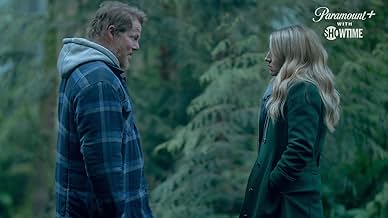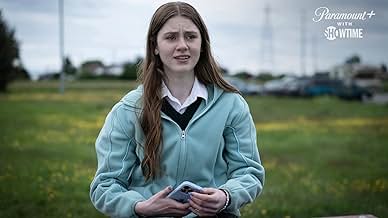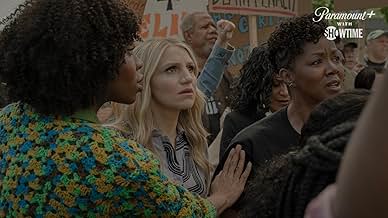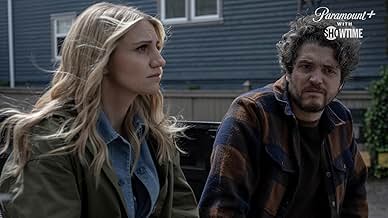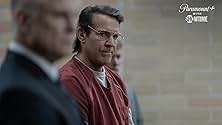The story of Melissa Jesperson-Moore, who at age 15 discovered that her father, Keith Hunter Jesperson, was the serial murderer known as the Happy Face Killer.The story of Melissa Jesperson-Moore, who at age 15 discovered that her father, Keith Hunter Jesperson, was the serial murderer known as the Happy Face Killer.The story of Melissa Jesperson-Moore, who at age 15 discovered that her father, Keith Hunter Jesperson, was the serial murderer known as the Happy Face Killer.
Browse episodes
Featured reviews
It's not bad, but I think it tries to do a lot of things at once, and as result does not get particular good at any of them. There are multiple plotlines (which is fine, of course), and they do make sense considering the circumstances, but most of them feel quite shallow. And investigation bits are not that compelling.
On one hand, that's all understandable, since it's based on real life, and real life is not that "dramatic" most of the time, but this is a TV show, so some extra dramatization could be beneficial. As is it feels more like they had specific points in a plan, that needed to be checked off, and they did just that.
On the other hand, the show has moments when it tries to be almost like a "thriller", especially with some choices in music, and with some camera shots. As if there is some mystery, but there actually is no mystery at all. If the same tension was applied to the whole series, especially to parts related to relationships inside the family - it probably would have had more impact.
This is still a decent watch, though. Annaleigh was great, other actors were not far behind most of the times as well. "The Cranberries" in the soundtrack? And it is way more cohesive compared to "Good American Family", that started around the same time and is also based on true events.
On one hand, that's all understandable, since it's based on real life, and real life is not that "dramatic" most of the time, but this is a TV show, so some extra dramatization could be beneficial. As is it feels more like they had specific points in a plan, that needed to be checked off, and they did just that.
On the other hand, the show has moments when it tries to be almost like a "thriller", especially with some choices in music, and with some camera shots. As if there is some mystery, but there actually is no mystery at all. If the same tension was applied to the whole series, especially to parts related to relationships inside the family - it probably would have had more impact.
This is still a decent watch, though. Annaleigh was great, other actors were not far behind most of the times as well. "The Cranberries" in the soundtrack? And it is way more cohesive compared to "Good American Family", that started around the same time and is also based on true events.
Great to see Dennis Quaid pull through with a creepy and hateable character.
The show is compelling and has got me well booked into where it's going to go
The hateable cast making dumb decisions details the otherwise interesting progression of the case, with the horrible performance by Annaleigh Ashford not doing any favours to my ability to watch more than 5 minutes without absolutely cringing.
Not 1 sentence, not 1 frame, not 1 expression is worthy of giving this woman the title of an "Actor". Absolutely drags the sub par performance of everyone else down with her...
Let's see where this goes...
The show is compelling and has got me well booked into where it's going to go
The hateable cast making dumb decisions details the otherwise interesting progression of the case, with the horrible performance by Annaleigh Ashford not doing any favours to my ability to watch more than 5 minutes without absolutely cringing.
Not 1 sentence, not 1 frame, not 1 expression is worthy of giving this woman the title of an "Actor". Absolutely drags the sub par performance of everyone else down with her...
Let's see where this goes...
The title pulled me in. The premise - a serial killer's daughter hiding her identity - had weight, tension, something dark and promising. And with Analeigh Ashford in the lead, I figured it had the bones to go somewhere. Episode 1 delivered. It leaned into the paranoia, the fear, the secrets.
Then the show took a wrong turn. The original premise faded, replaced by a routine detective drama padded with forgettable side characters and even more forgettable subplots. Melissa, once a compelling center, spirals into something shrill and exhausting. Her husband - a blank. Her daughter - unbearable.
But Dennis Quaid. He does something almost supernatural. As the serial killer - the actual murderer - he becomes the only one you want to watch. Charming, calm, and razor-sharp, he commands every scene with a twisted campy elegance. Somehow, he turns the monster into the magnet. You don't just understand him. You root for him.
It's a masterclass in subversion. The killer becomes the hero. Everyone else fades. And by the end, you realize the most dangerous man in the story is the only one worth following.
Then the show took a wrong turn. The original premise faded, replaced by a routine detective drama padded with forgettable side characters and even more forgettable subplots. Melissa, once a compelling center, spirals into something shrill and exhausting. Her husband - a blank. Her daughter - unbearable.
But Dennis Quaid. He does something almost supernatural. As the serial killer - the actual murderer - he becomes the only one you want to watch. Charming, calm, and razor-sharp, he commands every scene with a twisted campy elegance. Somehow, he turns the monster into the magnet. You don't just understand him. You root for him.
It's a masterclass in subversion. The killer becomes the hero. Everyone else fades. And by the end, you realize the most dangerous man in the story is the only one worth following.
It was an interesting perspective from the vantage point of a serial killer's family member. There is a plethora of true crime serial killer shows out there but very little about being related to one of them and the impact that has. I don't feel that the storyline's intention was to depict the serial killer's story, it was about his actions and the impact that had on those closest to him. In that instance, the series delivered. Quaid does a wonderful job of bringing the narcissistic, manipulative mind of a killer to the viewer and keeps it suspenseful. The show did have a lot of peaks and valleys with regard to maintaining the viewer's interest. Annaleigh Ashford also does excellent work in her portrayal of Melissa. I feel that the story line doesn't dig deep enough into her character to allow it to fully develop. The remaining characters were rather pedestrian and underdeveloped as well. Maybe there will deeper insights into them in further seasons should there be any. One major observation I had that was not addressed in the show was Jesperson's stature. Keith Jesperson was a MASSIVE individual standing 6'8". I discovered this just prior to watching the series and couldn't help but feel how much more intense his character would have been portrayed had this been addressed. The show is good, it's worth watching. It left me wanting a bit more than I was given. Maybe that was the point.
The series focuses less on the killer himself and more on the emotional wreckage his crimes have left behind for family members and victims. Annaleigh Ashford portrays Melissa with jittery vigilance, while Dennis Quaid triggers unease as the cold-eyed father with just a few glances.
The early episodes weave 1990s flashbacks together with a present-day investigation into an alleged new victim. Media frenzy, police work, and family trauma intersect, backed by a nervous score and high-contrast visuals that set warm home footage against chilly interrogation rooms.
Mid-season, however, the pacing sags. Sub-plots involving Melissa's daughter Hazel and journalist Ben feel stretched, as though the writers needed to pad out eight hours; episode 5 in particular bogs down in therapy sessions that rehash already familiar ground. Even so, the core question-does Jesperson really have another victim?-remains compelling enough to keep watching.
Strengths include the chemistry between Ashford and Quaid and the show's unflinching portrayal of violence's aftermath: no voyeuristic murder flashbacks, but rather nightmares, silence at the dinner table, and a podcast scene that neatly skewers the true-crime boom. Weaknesses are the uneven tempo, occasional tonal jolts between family drama and police procedural, and underdeveloped supporting characters.
All told, "Happy Face" delivers solid true-crime entertainment: atmospheric, thematically ambitious, yet occasionally sluggish. The plot maintains enough tension through the finale and resolves the central relationship convincingly without reinventing the genre.
The early episodes weave 1990s flashbacks together with a present-day investigation into an alleged new victim. Media frenzy, police work, and family trauma intersect, backed by a nervous score and high-contrast visuals that set warm home footage against chilly interrogation rooms.
Mid-season, however, the pacing sags. Sub-plots involving Melissa's daughter Hazel and journalist Ben feel stretched, as though the writers needed to pad out eight hours; episode 5 in particular bogs down in therapy sessions that rehash already familiar ground. Even so, the core question-does Jesperson really have another victim?-remains compelling enough to keep watching.
Strengths include the chemistry between Ashford and Quaid and the show's unflinching portrayal of violence's aftermath: no voyeuristic murder flashbacks, but rather nightmares, silence at the dinner table, and a podcast scene that neatly skewers the true-crime boom. Weaknesses are the uneven tempo, occasional tonal jolts between family drama and police procedural, and underdeveloped supporting characters.
All told, "Happy Face" delivers solid true-crime entertainment: atmospheric, thematically ambitious, yet occasionally sluggish. The plot maintains enough tension through the finale and resolves the central relationship convincingly without reinventing the genre.
Did you know
- TriviaMelissa Jesperson-Moore served as a crime correspondent for the Dr. Oz show. She's also written a book about her experiences.
- GoofsVery early in the first episode, the Melissa character calls her dad in prison to tell him to leave her and her family alone. You cannot call into a prison and leave a message for an inmate, and they don't get voicemail. The most you could do is call the prison during regular hours and hope they get the message to call you back.
Details
- Runtime57 minutes
- Color
- Sound mix
- Aspect ratio
- 2.39 : 1
Contribute to this page
Suggest an edit or add missing content






